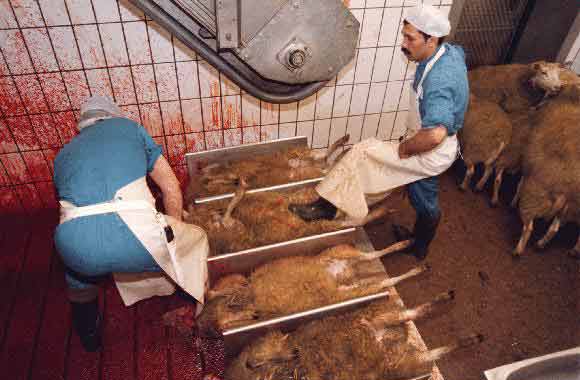For God's sake: what's got into you? |
Islamic tradition of respect for animals
We were travelling with the apostle of God and he left us for a while. During his absence we saw a bird named Hummara with her two youngsters and took them from her. The motherbird was flying circles above our heads, flapping her wings from grief. When the apostle returned he said: 'Who harmed the feelings of this bird by taking her young from her? Give them back to her at once' (Abdullah Ben Messaoud).
By Titus Rivas.
Pro-animal rights activists justifiably do not agree with the bloody phenomenon of ritual slaughter. Unfortunately this fact is frequently exploited by racist groups as a handy argument to ban Muslims as much as possible and to push them out of western society. Muslims are said to not be tolerant towards people with different opinions and towards sexual minorities, but especially they are said to be cruel towards animals. Hopefully many Western people know already that Islamic faith is not equal to fundamental terrorism, but also knows progressive humane and mystic varieties. It is probably less known that there is a fundamental Islamic tradition with respect for animals. |
Islamic attitude towards animals
The last and most prominent prophet of Islam, Muhammad, was known for his compassion with animals. He even would have mainly eaten vegetarian food. This is the exact opposite of the caricature that racists make of this religion. During the Foot and Mouth disease the Dutch Muslim Broadcast dedicated a programme on the contrast between the shameless reducing of animals to objects and Islamic vision on animals. In this programme they spoke out explicitly against factory farming and the farming policy nowadays which leads to such gruesome measures as massive removal of agricultural cattle. It is remarkable that the DMB spoke out so explicitly, because this shows that their views in a way spring automatically from Islamic tradition. Islamic religious figures and scholarly persons who were interviewed all agreed that although animals may be used for human consumption, this should happen definitely with respect for the perception of the animal. Their views relate largely on the same level as the free range movement.
This does not add up to the racist image of Muslims being ruthless and cruel to animals. On the contrary; in a moral way, Islam seems to be a fairly enlightened religion, which is concerned with respect for animals and the protection of animals against unnecessary cruelties. |
Directions
By its followers, Islam is experienced as a universal and rational religion, which, just like Judaism and Christianity, acknowledges only one God: Allah. Also, the religion elaborates on these other monotheistic religions and acknowledges its teachers, like Jesus, as prophets. The 7th century Arab prophet Muhammad is added, to whom the Quran, the infallible word of Allah, would have been revealed. The Arabic word 'Islam' means submission to Allah and a 'Muslim' is a person who surrenders to Allah.
Islam has a few orderly rules and directions that, if one adheres to these, would lead to an eternal bliss in the hereafter. Apart from that, the religion, like many others, knows some other movements. Also there are some known syncretistic hybrids between Islam and nature religions or other world religions that may differ on important issues from one another.
Some directions within Islam concern the interaction and treatment of animals. You should better not be surrounded by certain animals, like pigs, because they would be 'unclean' (haram). This meaning holds the middle between physically unhygienic and spiritually tainted. Other animal species however are clean and are acceptable for Muslims to use for human purposes, like consumption. It is of interest that the animals suffer as little as possible, an important condition for the qualification 'halal', which is comparable to the Jewish notion 'kosher'.
That a Muslim is permitted to eat halal meat, does not mean within Islam that one should eat meat at all. Every Muslim is free to make their own choice of becoming a vegetarian (or vegan). |
Slaughter
 During my quest through various websites about Islam, I noticed specifically that the slaughter of animals is not a duty for Muslims. Even during the pilgrimage to Mecca, one does not have to sacrifice a sheep. The slaughter of sacrificial animals goes way back to pre-Islamic cultural tradition. The Quran plays into this tradition by reforming and restraining practice. Because of this, the sacrifice of animals purely maintains a symbolic meaning, whereas in 'heathen' traditions it merely functioned as a means to put the gods in a favourable mood. As it shows, the sacrifice is a ritual one can do without. During my quest through various websites about Islam, I noticed specifically that the slaughter of animals is not a duty for Muslims. Even during the pilgrimage to Mecca, one does not have to sacrifice a sheep. The slaughter of sacrificial animals goes way back to pre-Islamic cultural tradition. The Quran plays into this tradition by reforming and restraining practice. Because of this, the sacrifice of animals purely maintains a symbolic meaning, whereas in 'heathen' traditions it merely functioned as a means to put the gods in a favourable mood. As it shows, the sacrifice is a ritual one can do without.
Islam values personal readiness for sacrifice and submission to Allah much more than the symbolic appearance. Because of this, one is definitely not obliged to sacrifice an animal and it holds no consequence if one decides against it. Most Muslims I've met, were remarkably understanding when I told them I'm really not in favour of their tradition of the slaughter feast. This is a ceremony where Muslims remember the slaughter of a ram by Ibrahim (Abraham). Apart from that, they thank God by means of the sacrifice, and share the meat with their needy fellow man. None of them defended this tradition as an inescapable religious duty. And it made no difference when I spoke with a Sunni Muslim from the Maghreb (Northern Africa), an Iranian person, or an Alevite from Turkey. According to some, it is not unthinkable that cultural traditions like both the slaughter of sacrificial animals and eating of meat will be largely abolished by modern Muslims.
Ritual slaughter is a method to kill animals as quickly and painlessly as possible. Doing this, one calls the name of Allah, to express one's consciousness about the holiness of life and to prevent unnecessary cruelty, both physically and mentally. Sacrificial animals should have led a good life in a natural environment. In practice however, according to certain Muslim writers, many slaughterhouses that act on so called 'halal' principles, are almost as cruel as 'normal', Western slaughterhouses. That's why these authorities plead in favour of a vegetarian or vegan way of life, for Muslims living in Western countries. Apart from the conditions in slaughterhouses, they say that also the circumstances of transportation of living animals isn't halal.
Some Muslim scholars also point to the fact that the method of slaughtering an animal is not about the specific ritual, but about the principle of extending as little suffering as possible. When modern slaughter techniques cause less pain than the traditional way, a Muslim should favour that method. |
Mercy
Almost all so-called surahs (chapters) of the Quran start with the words: 'Allah has mercy and is charitable'. The mercy of God is an important model for his followers. Muslims should treat all fellow men, including non-Muslims, as if they were brothers and sisters. According to popular tradition, Muhammad would explicitly have forbidden cruelty to animals and would have said amongst other things: "A good deed in favour of an animal is just as good as doing good deeds in favour of your fellow man, whilst a deed of cruelty towards an animal is just as evil as a deed of cruelty to a human being". A guideline of a Muslim scholar sounds: "be kind to beasts of burden; do them no harm; and don't burden them with more than they can take".
Islamic legislature, Shariah, is very explicit and elaborate when it comes to the rights of animals. Spectacles concerning the killing of animals to amuse the audience, like bullfights, are forbidden for Muslims and it's haram to eat the meat of animals killed this way. Also hunting for pleasure, the production of fur and testing of animals for unnecessary products like cosmetics, are against the laws of Islam and a Muslim should always be searching for alternatives for animal testing. Keeping birds unnecessarily in cages is seen as a very vile thing, as is the unnecessary maiming or cutting of animal body parts. Even harmful animals like poisonous snakes should be disposed of as painlessly as possible.
Torturing and unnecessary killing of animals in general is seen within Islamic tradition as a big sin, for which one should account on judgement day. On the other hand, protecting animals and treating them well, are things that count as good deeds when a soul is judged by God.
Following this tradition of empathy and charitableness, many Shiite Muslims and Islamic mystics, among which the Sufis like the wise man Kabir, who lived in the 15th century, look upon the vegetarian way of life as the ideal eating pattern. Just like Christians and Jews, Muslims are free to make their own choice to eat meat or not. They have no duty to do so, so Islamic views can very well be consistent with a vegetarian or vegan way of life. From this point of view, some organisations for vegetarian Muslims have been founded. |
|
|

